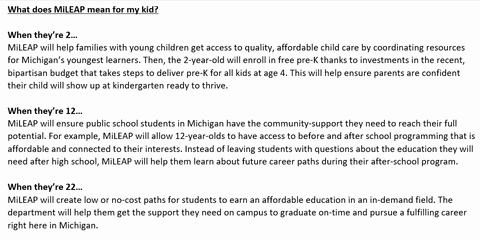On ‘Growing Michigan’ council, Alabas Farhat counts as fresh face
Whitmer’s search for youth appeal leads to Democratic Dearborn rep
When Gov. Gretchen Whitmer announced in June the creation of the Growing Michigan Together Council, critics noticed immediately that many of its members were old and not representative of the youth the state is hoping to attract to the state.
There was only one spot for someone under 25, and that person was not immediately announced.
Apparently the governor did not want to look far. Whitmer announced her choice of an under-25 member Thursday, and it was a familiar face in Lansing circles: State Rep. Alabas Farhat, D-Dearborn. Farhat was announced alongside fellow lawmakers Rep. Pauline Wendzel, R-Bainbridge Township, and Sen. Darrin Camillieri, D-Trenton.
But it was 23-year-old Farhat, a first-term lawmaker, who checked two boxes: He’s young, and he’s a House Democrat.
Another criticism of the Whitmer council is that it’s made up of people the governor knows or should know. Among them are Brian Calley, a former lieutenant governor; Sandy Baruah of the Detroit Regional Chamber; and John Rakolta, a former U.S. ambassador and a veteran of the construction business.
Farhat’s addition to the council continues that trend. I’ve interviewed Farhat before and found him to be a pleasant guy. No doubt he’ll make a contribution to the board. But couldn’t Whitmer just give Farhat a call? They travel in the same political circles.
People read news to learn things they don’t know. Governors form advisory boards to learn things they don’t know. Those things are best taught by people the governor doesn’t know.
Whitmer’s choice to fill the Growing Michigan Together Council with familiar faces defeats the group’s purpose.
Michigan Capitol Confidential is the news source produced by the Mackinac Center for Public Policy. Michigan Capitol Confidential reports with a free-market news perspective.


 Michigan growth council rejects transparency
Michigan growth council rejects transparency
 If you seek a pleasant peninsula, U-Haul will take you to Florida
If you seek a pleasant peninsula, U-Haul will take you to Florida
 Whitmer commission to grow Michigan starts work at undisclosed location
Whitmer commission to grow Michigan starts work at undisclosed location


 Gov. Gretchen Whitmer spent $204,444 on March trip to UK, and Ireland
Gov. Gretchen Whitmer spent $204,444 on March trip to UK, and Ireland
 State Board of Ed seeks ‘constitutional clarity’ on second Michigan department of education
State Board of Ed seeks ‘constitutional clarity’ on second Michigan department of education
 Senator raises concerns over constitutionality of Whitmer’s new education department
Senator raises concerns over constitutionality of Whitmer’s new education department